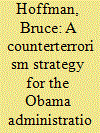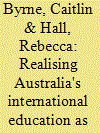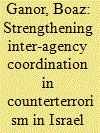| Srl | Item |
| 1 |
ID:
089984


|
|
|
|
|
| Publication |
2009.
|
| Summary/Abstract |
This article assesses the scope and nature of the current terrorist threat to the United States and suggests a strategy to counter it. Al-Qaeda continues to pose the most serious terrorist threat to the U.S. today. If the September 11, 2001 attacks have taught us anything, it is that al-Qaeda is most dangerous when it has a sanctuary or safe haven from which to plan and plot attacks. Al-Qaeda has acquired such a sanctuary in Pakistan's Federal Administered Tribal Areas (FATA) and its North-West Frontier Province (NWFP) and surrounding environs. Accordingly, the highest priority for the new American presidential administration must be to refocus our-and our allies'-attention on Afghanistan and Pakistan, where al-Qaeda began to collapse after 2001, but has now re-grouped. This will entail understanding that al-Qaeda and its local militant jihadi allies cannot be defeated by military means alone. Success will require a dual strategy of systematically destroying and weakening enemy capabilities-that is, continuing to kill and capture al-Qaeda commanders and operatives-along with breaking the cycle of terrorist recruitment among radicalized "bunches of guys" as well as more effectively countering al-Qaeda's effective information operations. The U.S. thus requires a strategy that harnesses the overwhelming kinetic force of the American military as part of a comprehensive vision to transform other, non-kinetic instruments of national power in order to deal more effectively with irregular and unconventional threats. This article first discusses the scope and details of the terrorist threat today and then proposes a counterterrorism strategy for the new presidential administration. It focuses first on creating a micro approach to address the deteriorating situation in both Afghanistan and Pakistan. It then considers the requirements of a broader macro strategy to counter terrorism and insurgency.
|
|
|
|
|
|
|
|
|
|
|
|
|
|
|
|
| 2 |
ID:
127063


|
|
|
|
|
| Publication |
2013.
|
| Summary/Abstract |
Australia's international education serves as public diplomacy, essentially engaging and influencing public audiences in ways that progress Australian foreign policy priorities and national interests. The multidimensional and increasingly globalised nature of international education presents enormous opportunity for vital exchange and interactions between and with students, academics and communities via onshore and offshore modes of delivery. Positive experiences of student mobility and the development of intellectual, commercial and social relationships can build upon a nation's reputation, and enhance the ability of that nation to participate in and influence regional or global outcomes. This is ultimately the essence of soft power. While Australia has made significant commercial gains through international education, it has fallen short of realising the soft power potential inherent in the volume and depth of interactions, relationships and achievements resulting from it, particularly in the Asian region, where Australia's international education sector continues to be most active. This article argues that there is a soft power benefit in recognising international education as public diplomacy, though acknowledges that challenges exist in connecting the soft power aspirations to reality. Findings suggest that there is room for more coherent public diplomacy leadership and inter-agency coordination, improved evaluation and expanded dialogue both within the sector and the broader community.
|
|
|
|
|
|
|
|
|
|
|
|
|
|
|
|
| 3 |
ID:
186056


|
|
|
|
|
| Summary/Abstract |
The September 1972 Munich Olympics massacre brought to light the critical need for internal coordination and international cooperation among intelligence, security and enforcement agencies, government ministries, and many others who deal with counterterrorism. Through an historical overview of the role of the counter-terrorism bureau and with interviews of its former directors, this article presents the security lessons learned from the attack while providing an overview of the counterterrorism coordinator’s critical role in coordinating organisations focused counterterrorism operations, policy, and law.
|
|
|
|
|
|
|
|
|
|
|
|
|
|
|
|